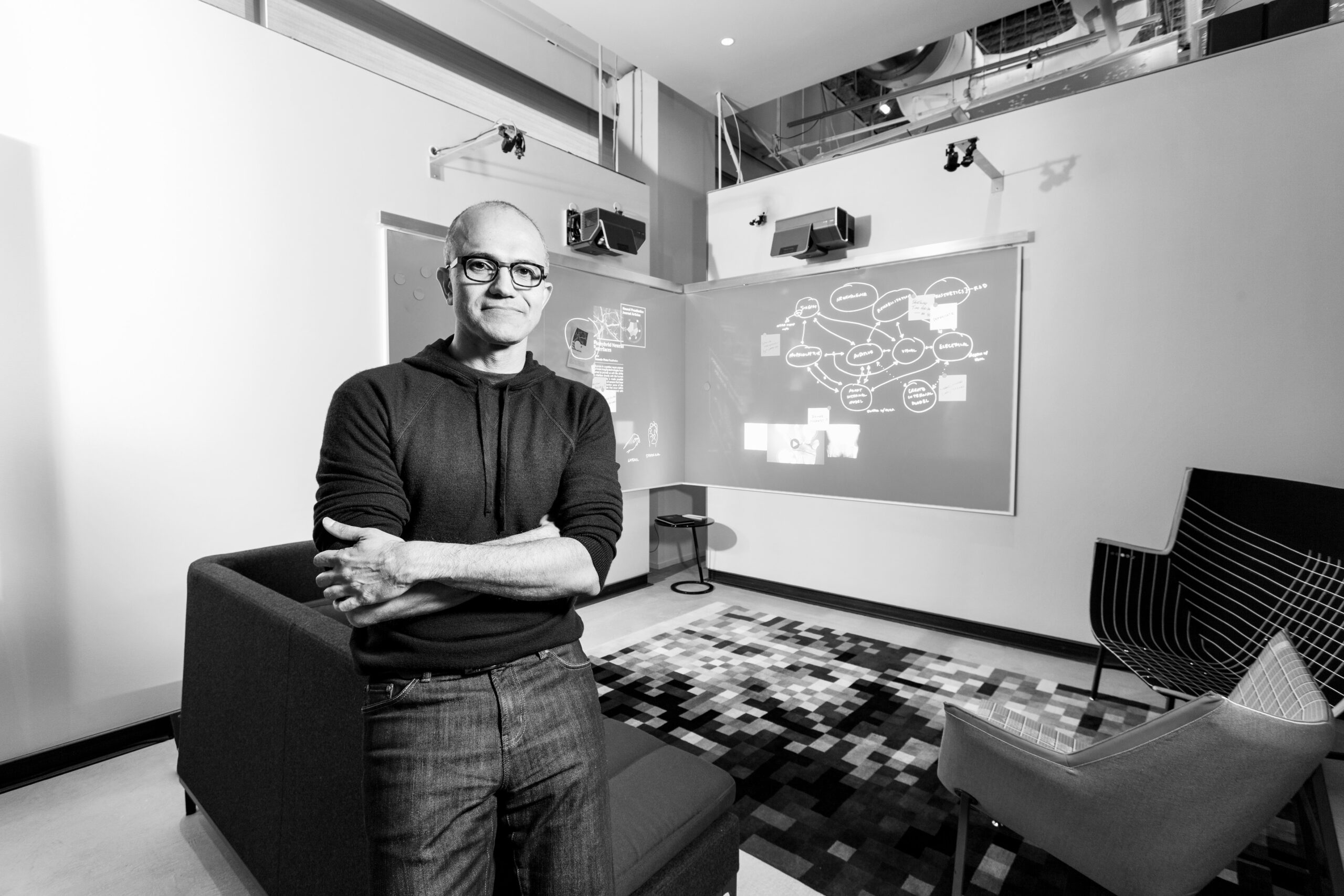As the head of one of the world’s biggest tech giants, celebrating its golden anniversary, CEO, Satya Nadella shares his vision on reinvention, AI, and why relevance trumps longevity. Read on for the facts changing our world now.
At 50, Microsoft stands as one of tech’s most enduring success stories. But Satya Nadella, only the third CEO in the company’s history, isn’t interested in looking back. His focus remains squarely on what’s next for the $3-trillion giant. “What got us here is not being obsessed about longevity, but being more obsessed about relevance,” Nadella says. “We are a consequential company. We’re here not because we somehow achieved something in the past. It’s more because we are willing to push ourselves to be relevant again in a different context.” This mindset has driven Microsoft since day one, when Paul Allen rushed into Bill Gates’ Harvard dorm room with a copy of Popular Electronics magazine, sparking what would become the world’s most influential software company. Now, half a century later, that same hunger for relevance is propelling Microsoft into the era of artificial intelligence (AI).
Betting big on AI
Since taking the helm in 2014, Nadella has navigated Microsoft through perhaps its most successful reinvention yet. The India-born executive, who earned his bachelor’s in electrical engineering from Mangalore University before completing master’s degrees in computer science and business from American universities, has transformed Microsoft from a Windows-dependent business into a cloud computing powerhouse. Nadella’s connection to Microsoft runs deep. He joined in 1992 during what he calls “the beginning of the client-server era” when Windows 3 had just launched and Windows NT (a completely new, 32-bit operating system) was yet to be named. And during his tenure, Microsoft’s market value has soared past $3 trillion – a testament to his vision of cloud-first, mobile-first computing that has since evolved to embrace AI at every level. “We’re in the very early stages of reconceptualizing what the web looks like for the agentic web,” Nadella explains. “In some sense, you can think of these AI agents or assistants as the new browsers.”
Windows, reimagined
Loading...
For all the talk of cloud and AI, Windows remains central to Microsoft’s identity. “One of the dreams I have for Windows going forward is what’s the way both the function and the form, or what is a Windows computer in this agentic web?” he says. “Windows is being built for what is going to be the future of agents.” He envisions interactions that transcend traditional mouse and keyboard inputs. “It’s pretty surreal to be able to switch on Copilot and have a full duplex conversation with an agent that also knows the context of what I’m operating on. Copilot is the first app,” Nadella adds, suggesting this AI assistant represents just the beginning of a fundamental shift in how we interact with computers. The transformation of Windows epitomizes this forward-looking approach. Nadella shares how, for example, he recently used GitHub Copilot to build an Altair emulator and BASIC interpreter (the first product Gates created) in just one hour. “Look at it. We’ve come 50 years to be able to do what Bill may have done in a couple of all-nighters. Now anybody can ‘white code’ their way to building,” he says. Even more importantly, this democratization extends to entrepreneurship. “For the entrepreneur, you have unbelievable tools to realize that dream,” he explains. “You now have the ability to change the aperture, the scope and the scale of your ambition.”
Democratizing technology globally
“Our mission is to democratize access to tech,” Nadella emphasizes. “Microsoft has always been that technology company that allowed me to build technology or feel good about creation.”
The company recently announced plans to invest R5.4 billion ($297 million) to expand its cloud and AI infrastructure in South Africa by 2027, building on its existing R20.4 billion ($1.12 billion) investment that established the nation’s first, enterprise-grade datacenters. This investment aims to enable organizations of all sizes to access cloud and AI solutions, driving innovation across the South African economy. The company has also committed to skilling one million South Africans by 2026 and will pay for 50,000 young people to become ‘Microsoft Certified’ in high-demand skills like AI, data science and cybersecurity analysis. This investment in infrastructure and skills training represents Nadella’s vision of AI as a truly global technology that benefits both developed and developing nations equally. “Having grown up in the Global South, I feel every day that there might be a general-purpose technology that won’t have this distinction between the Global North and Global South,” he reflects. “AI, interestingly enough, probably, is that technology that will help a rural Indian farmer and an entrepreneur on the West Coast of the United States to the same degree.”
What’s next
“As we enter our 51st year, I care a lot more about whether we’re doing relevant things now, versus talking about our last 50 or the next 50,” he insists. “The essence of this industry is it’s pretty harsh for anybody who rests on their laurels or projects way too much into the future,” Nadella says. This is why he is so focussed on the present while building for the future. This is what defines Microsoft at 50 but his enthusiasm for AI’s potential to bridge global divides comes from personal experience. “When I look back, I’m as excited about what we want to work on as I was in ‘92 in terms of the opportunity,” he says with characteristic optimism. The company that revolutionized personal computing is once again at technology’s frontier. “That abundance, that ability to democratize access to tech,” Nadella reflects, “is what we are again, yet again, having a chance to live and build.”
Loading...
